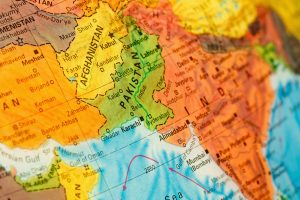A spokesman for the Taliban’s Ministry of Defense pushed back Wednesday on comments made a day earlier by a Pakistan army spokesman, alleging that the March suicide bombing that killed five Chinese engineers was planned in Afghanistan and perpetrated by an Afghan citizen.
Enayatullah Khawarazmi, the spokesperson for Afghanistan’s Ministry of Defense said, “Blaming Afghanistan for such incidents is a failed attempt to divert attention from the truth of the matter and we strongly reject it.”
Major General Ahmed Sharif, the director-general of the Pakistani army’s Inter-Services Public Relations (ISPR) – the army’s PR wing – gave a lengthy press conference on May 7 in which he touched on a variety of issues, from Imran Khan’s Pakistan Tehreek-e-Insaf (PTI) and questions of election rigging to rumors that Islamabad has turned over air bases to the United States and of Indian operations on Pakistani soil. Sharif also discussed the March 26 attack that killed five Chinese engineers in Khyber Pakhtunkhwa province.
“This suicide bombing also connects to across the border [in Afghanistan]; the planning of this terrorism [act] was done in Afghanistan. Terrorists and their facilitators were also being controlled from Afghanistan and the suicide bomber was also an Afghan [national],” he said.
Sharif linked continued Tehreek-i-Taliban Pakistan (TTP) attacks to the current powers-that-be in Afghanistan, alleging, “There is concrete evidence that TTP terrorists are still using Afghan soil to launch attacks in Pakistan.”
Khawarazmi, the Taliban defense ministry spokesman, called Pakistan’s claims “irresponsible and far from reality.”
He noted Taliban engagement with China, saying that “[t]he Islamic Emirate has assured China on this matter, and the country has also understood that Afghans are not involved in such issues.”
In September 2023, the Taliban welcomed Ambassador Zhao Sheng as Beijing’s new representative in Kabul. Five months later, in late January 2024, China became the first country in the world to welcome an ambassador from the Taliban when Bilal Karimi presented his credentials alongside other new ambassadors in Beijing.
China’s ambassador in Kabul publicized a spate of meetings in late April and early May with a variety of Taliban officials, including Acting Defense Minister of Afghanistan Mohammad Yaqoob Mujahid on May 4.
“The killing of Chinese citizens in an area of Khyber Pakhtunkhwa that is under tight security cover by the Pakistan Army shows the weakness of the Pakistani security agencies, ” Khawarazmi said. He also countered Sharif’s claim with Kabul’s own accusation that Pakistani territory is being used to stage attacks against Afghanistan.
The back-and-forth illuminates the difficult and complex ties between Pakistan and Afghanistan. The bilateral relationship has long ebbed and flowed, with periods of tension that predate the Taliban’s rise to power following the withdrawal of Western forces in August 2021. Nevertheless, Pakistani authorities had initially welcome the Taliban’s return to power, viewing it as an opportunity – particularly when it came to dealing with the TTP. But in the years since 2021, the Afghan Taliban have either been unwilling or unable to satisfy Islamabad’s demands when it comes to the TTP.
In the meantime, since October 2023 Pakistan has pushed more than 563,000 of what it calls illegal immigrants – Afghans, many of whom have lived for decades in Pakistan – back across the border.

































